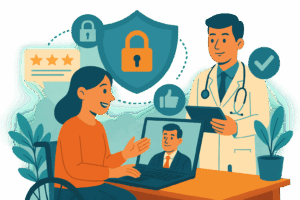
Time can fly by fast, and before you know it, you’re entering retirement age. Your golden years can be an excellent time to relax, spend time with loved ones, and accomplish all you’ve ever wanted to do, but you’ll need to be healthy to do so. You won’t be able to do much if your health limits you. The older you get, the greater the chance you can develop chronic diseases or mobility problems. You can stay on top of your health with a few simple habits and practices that won’t limit your fun or happiness at all.
Eat a Balanced Diet
The food you eat should provide you with most of the necessary nutrients to stay healthy. Nutrients help repair tissue, give you energy, and keep your body systems functioning properly. From carbohydrates to fats, each nutrient, when balanced well, is very beneficial to your health. You don’t want to deprive yourself of nutrients, but you also don’t want to eat too much. A nutritionist can help create a diet plan that works best for your body’s specific needs. Otherwise, you can work on eating a daily balance rich in nutrients like fiber, lean protein, healthy fats, Vitamin C, and Vitamin D. Whole grains, fruits, vegetables, vegetable oils, eggs, salmon, and white-meat chicken are some excellent ingredients to use. Get your blood tested for any nutrient deficiencies. You may want to take multivitamins if your diet does not provide a sufficient supply.
Start a Senior-Friendly Fitness Routine
Keeping your body fit and flexible can help you stay active, energetic, and strong as you get older. Muscles and bones can weaken over time, and conditions like arthritis can limit flexibility and mobility. When you’re active throughout your life, you keep your muscles, joints, and bones at peak performance. Exercise helps reduce stress, anxiety, and other mental health concerns as well. You don’t need to run marathons; any type of activity to keep your cardio and strength in shape works. Walking your dog, swimming in the pool, and gardening are excellent senior-friendly activities to do. If you want to spice things up, try a dance class or some goat yoga. You can consult with a personal trainer or sign up for a senior fitness class to make sure you’re not overexerting yourself. If you do end up developing arthritis or other types of chronic pain, a physical therapist can help you move and stay fit without excessive pain.
Get Regular Health Checkups
Preventive healthcare ensures you’re staying on top of any concerns before they become an issue. As you age, you’re more susceptible to conditions like cancer, dementia, and arthritis. When you work with your doctor regularly, you can mitigate the chances of developing diseases or allowing them to worsen your health. Routine physicals, a good primary care physician, preventative lab testing, and decent health insurance all work together to keep you at your healthiest. Maintaining regular appointments is very important, even if you’re busy or don’t feel up to it. You may be able to arrange at-home health appointments or bloodwork to make things easier as you get older. Your location typically doesn’t matter; you can arrange for a mobile phlebotomist in Connecticut all the way to California. Ask your doctor or health insurance provider about what may be available to you.
Create a Safe Living Space
While you may be able to navigate your home safely right now, this may not always be the case. As you age, mobility can decline, making it harder to use everyday home features like round doorknobs or high bathtub thresholds. Identify any pain points that might be unsafe to navigate as you age. Common trip hazards include thick or overturned rugs, slippery floor materials, slick bathtub surfaces, staircases, or narrow corridors. Make sure there is plenty of room to navigate, and don’t be afraid to downsize your home if you’ve outgrown it. Senior living communities might be a good consideration if you live alone or need more assistance with daily activities.
Foster Good Mental Health
Staying healthy as you age doesn’t just involve physical health. Your mental health must be taken care of as well, as depression and anxiety can be intensified by feelings of isolation or as symptoms of dementia. You can improve your mental health by seeking a trusted mental health professional, finding healthy outlets for your emotions, such as exercise or crafts, and engaging in mindfulness techniques like meditation or journaling. Medications may be useful for chronic mental health conditions like depression. Stay social as you get older and find new opportunities to connect with your community and make friends. Social activity can help enrich your mind and improve cognitive ability. Learning or practicing hobbies or crafts can help improve brain health as well.
Don’t Sacrifice Sleep
It can be easy to sacrifice sleep for a busy work day or a packed schedule, but it’s not advisable to chronically limit your sleep. Without proper rest, your body can’t heal and function properly. Your energy will be limited, and there will be a greater chance of developing heart disease, cancer, and many other conditions. Aim for at least six to eight hours of sleep each night. Try to limit your physical activity and use of screens before bedtime. Create a routine to get to bed around the same time each night if possible.
Conclusion
Taking care of your body, mind, and health is always important, but the older you are, the more vulnerable you are to health conditions and diseases. Eating a balanced diet, staying active, and getting enough sleep are excellent ways to stay sharp, but you’ll need to be proactive about your healthcare, social life, and the safety of your living space as well. Familiarize yourself with common health issues that affect older adults, like dementia or arthritis, to make more informed decisions about your living arrangements and nutrient intake. You mustn’t forget about mental healthcare in your action plan, either. It’s always a good idea to stay on top of your health, safety, and happiness.








